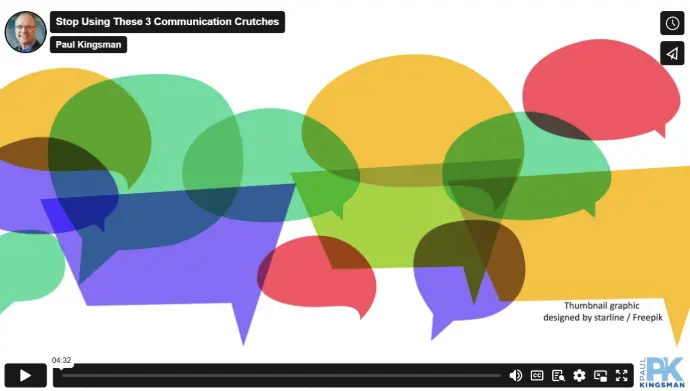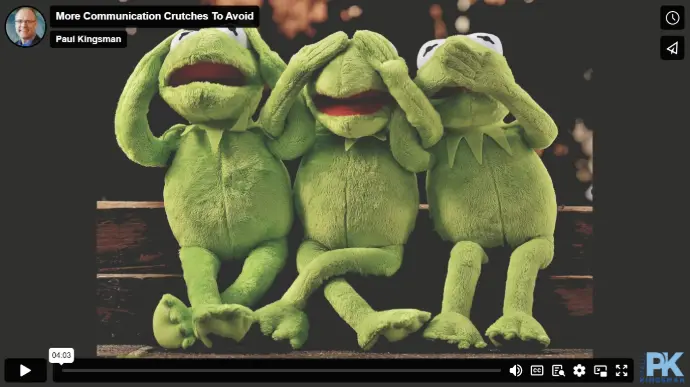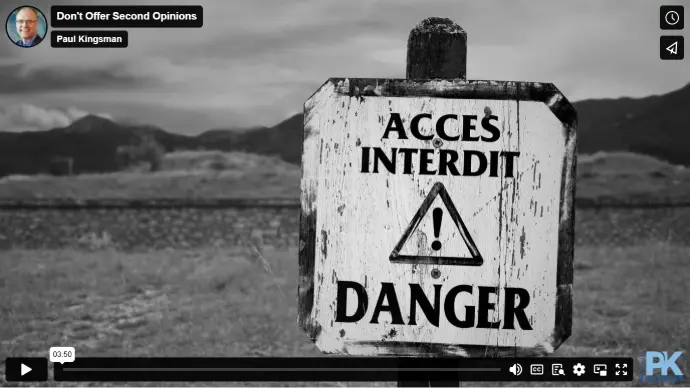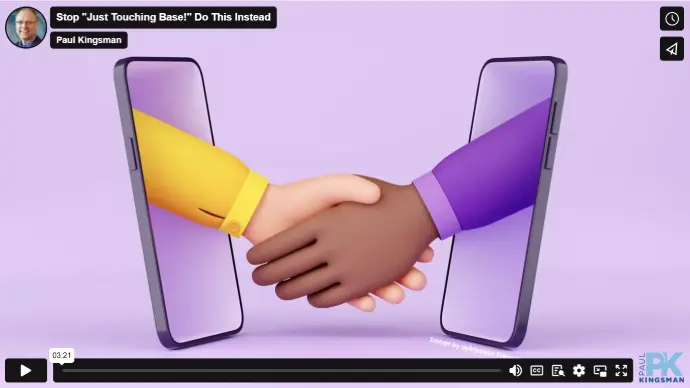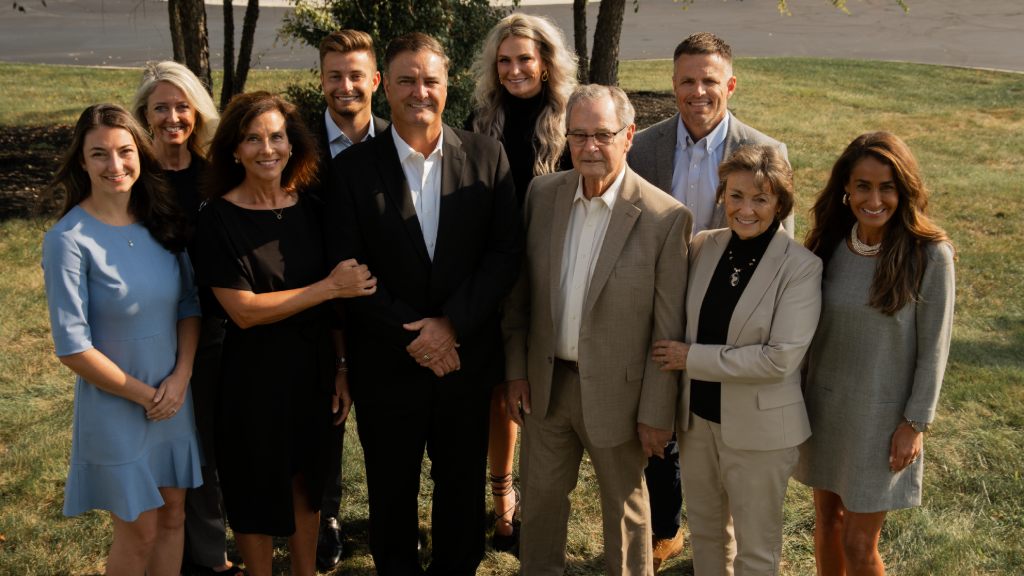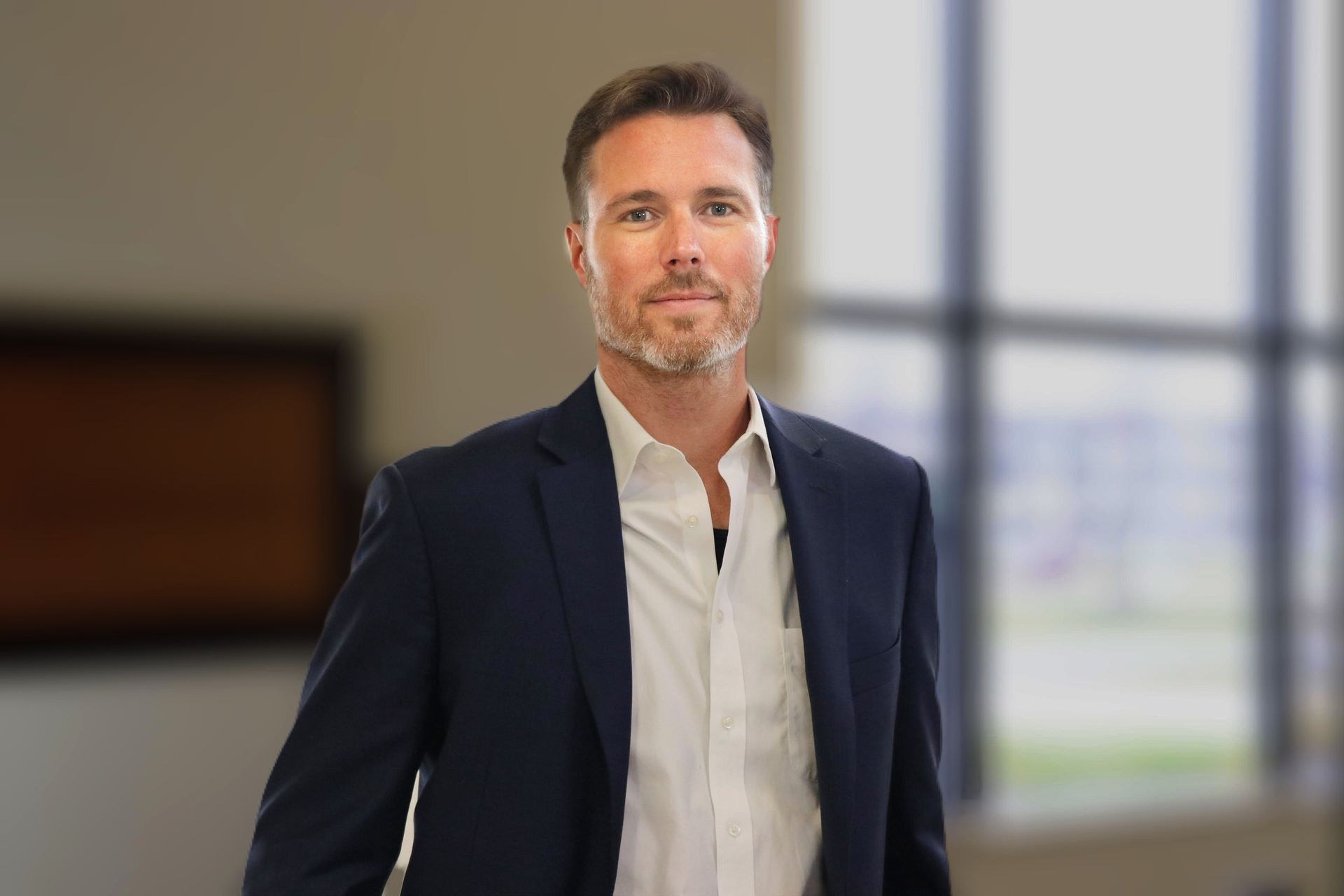Don’t Offer Second Opinions
(Distraction-Proof Advisor)
Paul Kingsman Live on Tuesday Aug 12th
Referral Language That Works In The Real World
While offering second opinions on people’s investment accounts is a widely-promoted prospecting tool, I say don’t.
- Don’t offer second opinions. And if people ask you for one, tell them no and explain why.
- Have the language you’ll use in your explanation planned and ready to use.
- Use your explanation to demonstrate the broad range of ways you help your clients and what you could be doing for prospects.
Transcript
Beware of using this widely-promoted prospecting approach.
…
I’m talking about offering a second opinion.
I was with a group two weeks ago, and this was raised. Several people came around as I mentioned what we used to say and, actually, what we didn’t say when I was advising in the group I worked with. We specifically told people,
“We actually don’t offer a second opinion because we don’t know anything about you. We don’t know your aspirations, we don’t know the choices you want. I’d love to have a conversation with you to learn more about you and the choices you want, to see if it’s an appropriate fit for you and me to work together.
But offering you a second opinion based upon where you’re at right now and what you’re doing right now with another advisor… I want to go deeper than that with you. So, when you’re ready to talk about the objectives you want to hit, the goals you want to reach, absolutely give me a call. Here’s my business card. I’m two blocks down the road. Give me a shout, and we’ll talk then.”
That’s the kind of response I’d have.
When you offer a second opinion to people, what is it really a second opinion on? They may have five accounts and give you one to look at. How can you offer a practical or thorough second opinion on just that? You don’t know their whole story and how all the pieces go together. You don’t know their tax circumstances, even whether they file jointly or separately. You don’t know about inheritances they’re expecting or legacy plans they have. There’s not enough information for you to provide a reasonable or effective second opinion.
And by letting them know the comprehensive approach you take to ensure you are doing your job thoroughly and providing what is best for your clients, you show prospects the real value of the service you provide. It shows them what they should be thinking about related to their own financial well-being and how you help your clients with those details. It might even make prospects a bit concerned about their advisors and have them wondering if they have covered these bases for them. Are their advisors integrating all these different points you’ve flagged?
If you’re asked, get comfortable letting people know you don’t offer a second opinion. It’s just not the right thing to do for the person—you simply don’t know enough about them. You can say, “But clearly, you’re interested in talking about your circumstances. I’d love to sit down, learn more about you and your aspirations, and see if it’s a good fit for us to work together.” That’s the kind of language you want to have roll.
So, when it comes to offering a second opinion,
- Don’t! Let people know you don’t offer a second opinion, and here’s why…
- Have language ready to explain why: “The reason we don’t offer a second opinion is because we don’t enough about you. We don’t know your goals, your aspirations, the choices you want. We don’t know your tax circumstances.” You want to let prospects know there are a number of things you need to know about them before you consider working together.
- Be clear about how you help by letting them know, these are all the different areas that you need to know, even before you start working with them. You’re likely to get them thinking, “Have these bases been covered by my current advisor?”
You have a great chance to showcase yourself here. By simply getting them to give you one account of maybe six, you’re not going to know anything meaningful about them. And, from a fiduciary perspective, you shouldn’t be doing this. Let prospects know you want to understand their whole picture, “to see if it’s good that we work together or not.” And if the details point to a good fit, you can let them know that, based upon what you’re seeing, you think you both could really work well together. “I’d love to help you pursue and achieve the objectives we’ve discussed and would like to start working together!”
For more Distraction-Proof Advisor videos, click here.
CFD Companies is proud to be collaborating with Paul Kingsman.
About Paul Kingsman
Paul Kingsman, Ash Brokerage’s Practice Management Director, is a sought-after expert on how to be distraction-proof. Through his speaking, writing, and coaching, he teaches financial services professionals how to maintain focus and take practical daily steps to successfully grow their businesses and achieve outstanding long-term results. To find out more about Paul and how he can equip you or your team to achieve your own outstanding results, use the contact form below.
Use the form below to reach out to Paul.

*Paul is Registered with Ash Brokerage. Ash Brokerage is one of the largest insurance brokerages in the United States, with more than 400 employees nationwide.
About CFD Companies
CFD Companies is home to a fully independent Broker/Dealer and RIA that believe individuals are best served by a financial professional who possesses the freedom to implement personalized planning and investment strategies. The CFD Companies operate on the premise that an adviser’s Broker/Dealer and RIA should act as a partner and resource network, empowering adviser-client relationships through trust, innovative support and a shared commitment to mutual growth. Contact Us with any questions you have for us at CFD Companies.
While others operate in cliché, CFD operates in commitment. To learn more about that commitment and the future of your business in partnership with CFD, reach out to us below.
